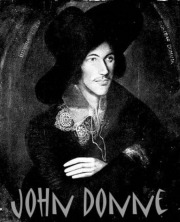Pun
a play on words that are identical or similar in sound but have sharply diverse meanings. Puns can have serious as well as humorous uses. An example is Thomas Hood’s:" They went and told the sexton and the sexton tolled the bell.”
A Hymn To God the Father
John Donne
Wilt thou forgive that sin where I begun,
Which is my sin, though it were done before?
Wilt thou forgive that sin through which I run,
And do run still, though still I do deplore?
When thou hast done, thou hast not done,
For I have more.
Wilt thou forgive that sin by which I have won
Others to sin? and made my sin their door?
Wilt thou forgive that sin which I did shun
A year or two, but wallowed in a score?
When thou hast done, thou hast not done,
For I have more.
I have a sin of fear, that when I have spun
My last thread, I shall perish on the shore;
Swear by thyself, that at my death thy Son
Shall shine as he shines now and heretofore;
And, having done that, thou hast done,
I fear no more.
A pun is used in the poem “A Hymn To God The Father”, written by John Donne. “Death thy Son shall shine as he shines now” is a play on the words “sun” and “son”. The narrator is talking to his son, but is describing how at his death his son will still “shine” as he “shines” now. By using this pun, Donne introduces the meaning of the poem, “I fear no more”. The poem describes the sin a father has committed throughout his life time, and how he wishes his son’s forgiveness. He has “a sin of fear, that when [he has] spun [his] last thread, [he] shall perish on thy shore”. His last wish is for his son to “shine” at his funeral, so people will know that his son is not like him.

"Wicked is not much worse than indiscreet." ~John Donne
John Donne

John Donne was born to a prosperous London ironmonger (also named John Donne), in 1572. The Donne's were Catholic, and young John was educated by Jesuits. His father died when he was young, and he was raised by his mother, Elizabeth.
At the age of 11, John Donne went to Hart Hall at Oxford University, where he studied for 3 years, and then proceeded to Cambridge University for another 3 years. Donne did not take a degree at either university, because as a Catholic he could not take the required Oath of Supremacy at graduation.
After Cambridge, Donne studied law at Lincoln's Inn in London. His faith was badly shaken when his younger brother Henry died in prison, where he had been sent for sheltering a Catholic priest. Donne's first literary work, Satires, was written during this period. This was followed by Songs and Sonnets. a collection of love poems that enjoyed considerable success through private circulation.
Donne gained a comfortable inheiritance, which he proceeded to spend in profligate fashion on "wine, women, and song". He joined the Earl of Essex's raid on Cadiz in 1596, and an expedition to the Azores the following year.
On his return Donne became private secretary toi Sir Thomas Egerton, Lord Keeper of the Great Seal. His chances of career advancement were destroyed when he secretly married Anne More, daughter of Sir George More. Anne's enraged father had Donne thrown into Fleet Prison for several weeks, and Egerton dismissed him from his post.
Donne's marriage was a happy one, despite constant financial worries. With typical wry wit, Donne described his life with Anne as "John Donne, Anne Donne, Undone". Finally, in 1609, George More was induced to relent and pay his daughter's dowry. In the meantime Donne worked as a lawyer, and produced Divine Poems (1607).
Donne's final break with his Catholic past came with the publication of Pseudo-Martyr (1610) and Ignatius his Conclave. These works won him the favour of King James, who pressured him to take Anglican orders. Donne reluctantly agreed, and in 1615 he was appointed Royal Chaplain, and the following year he gained the post of Reader in Divinity at Lincoln's Inn. There his fierce wit and learning made Donne one of the popular preachers of his day.
Then in 1617 Anne Donne died in giving birth to the couple's 12th child. Her death affected Donne greatly, though he continued to write, notably Holy Sonnets (1618).
In 1621 Donne was appointed Dean of St. Paul's, a post he held for the remainder of his life. In his final years Donne's poems reflect an obsession with his own death, which came on March 31, 1631.
John Donne is remembered for the wit and poignancy of his poetry, though in his own time he was known as much for his mesmerizing sermons and preaching style.
As an aside, Donne's memorial in St. Paul's Cathedral was the only one to survive the Great Fire that destroyed the old cathedral in 1666. It can be seen today in the new St. Paul's.
(http://www.britainexpress.com/History/bio/donne.htm)
